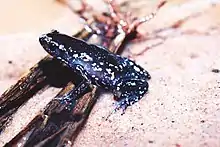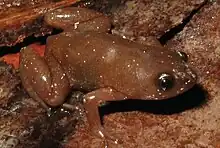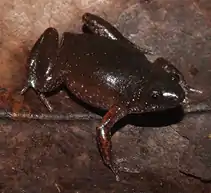Chiasmocleis
Chiasmocleis is a genus of frogs in the family Microhylidae.[1][2] They live in tropical South America north and east of the Andes. English speakers call them humming frogs or silent frogs.[1]
| Chiasmocleis | |
|---|---|
 | |
| Chiasmocleis albopunctata | |
| Scientific classification | |
| Domain: | Eukaryota |
| Kingdom: | Animalia |
| Phylum: | Chordata |
| Class: | Amphibia |
| Order: | Anura |
| Family: | Microhylidae |
| Subfamily: | Gastrophryninae |
| Genus: | Chiasmocleis Méhelÿ, 1904 |
| Type species | |
| Engystoma albopunctatum Boettger, 1885 | |
| Species | |
|
36 species (see text) | |
| Synonyms[1] | |
| |
Taxonomy
Scientists have trouble deciding where to put this genus because it looks like not all of these frogs have the same ancestor. As of mid 2021,[1] scientists agreed to put frogs that used to be in the genus Syncope into Chiasmocleis, but they also agreed to make three clades into subgenera:[1][3]
- Chiasmocleis Méhelÿ, 1904
- Syncope Walker, 1973
- Relictocleis Dubois, Ohler, and Pyron, 2021 (syn. Unicus, Relictus)
Of these, Relictocleis is the most different from the other two.[3] Some scientists think it should be its own genus. Relictocleis gnoma would be its only species.[1]

Description
Chiasmocleis frogs have small bodies and small legs. The male and female frogs look different: Male frogs have darker chins, and some of them have spines. The frogs from the subgenus Syncope are even smaller and have fewer bones in their paws and tose. Relictocleis frogs are also very small.[3]
Ecology
Chiasmocleis live underground some or most of the time. They are hard to see against dirt or dead leaves. They only look for food on the surface for a few days during the time when they lay eggs. This is at the beginning of the rainy season. They live in both forests and open places.[3]
Species

These species are in Chiasmocleis:[1]
- Chiasmocleis alagoana (Cruz, Caramaschi, and Freire, 1999)
- Chiasmocleis albopunctata (Boettger, 1885)
- Chiasmocleis altomontana (Forlani, Tonini, Cruz, Zaher, and de Sá, 2017)
- Chiasmocleis anatipes (Walker and Duellman, 1974)
- Chiasmocleis antenori (Walker, 1973)
- Chiasmocleis atlantica (Cruz, Caramaschi, and Izecksohn, 1997)
- Chiasmocleis avilapiresae (Peloso and Sturaro, 2008)
- Chiasmocleis bassleri (Dunn, 1949)
- Chiasmocleis bicegoi (Miranda-Ribeiro, 1920)
- Chiasmocleis capixaba (Cruz, Caramaschi, and Izecksohn, 1997)
- Chiasmocleis carvalhoi (Nelson, 1975)
- Chiasmocleis centralis (Bokermann, 1952)
- Chiasmocleis cordeiroi (Caramaschi and Pimenta, 2003)
- Chiasmocleis crucis (Caramaschi and Pimenta, 2003)
- Chiasmocleis devriesi (Funk and Cannatella, 2009)
- Chiasmocleis gnoma (Canedo, Dixo, and Pombal, 2004)
- Chiasmocleis haddadi (Peloso, Sturaro, Forlani, Gaucher, Motta, and Wheeler, 2014)
- Chiasmocleis hudsoni (Parker, 1940)
- Chiasmocleis jimi (Caramaschi and Cruz, 2001)
- Chiasmocleis lacrimae (Peloso, Sturaro, Forlani, Gaucher, Motta, and Wheeler, 2014)
- Chiasmocleis leucosticta (Boulenger, 1888)
- Chiasmocleis magnova (Moravec and Köhler, 2007)
- Chiasmocleis mantiqueira (Cruz, Feio, and Cassini, 2007)
- Chiasmocleis mehelyi (Caramaschi and Cruz, 1997)
- Chiasmocleis migueli (Forlani, Tonini, Cruz, Zaher, and de Sá, 2017)
- Chiasmocleis papachibe (Peloso, Sturaro, Forlani, Gaucher, Motta, and Wheeler, 2014)
- Chiasmocleis parkeri (Almendáriz C., Brito-M., Batallas-R., Vaca-Guerrero, and Ron, 2017)
- Chiasmocleis quilombola (Tonini, Forlani, and de Sá, 2014)
- Chiasmocleis royi (Peloso, Sturaro, Forlani, Gaucher, Motta, and Wheeler, 2014)
- Chiasmocleis sapiranga (Cruz, Caramaschi, and Napoli, 2007)
- Chiasmocleis schubarti (Bokermann, 1952)
- Chiasmocleis shudikarensis (Dunn, 1949)
- Chiasmocleis supercilialba (Morales and McDiarmid, 2009)
- Chiasmocleis tridactyla (Duellman and Mendelson, 1995)
- Chiasmocleis ventrimaculata (Andersson, 1945)
- Chiasmocleis veracruz (Forlani, Tonini, Cruz, Zaher, and de Sá, 2017)
References
- Frost, Darrel R. (2021). "Chiasmocleis Méhely, 1904". Amphibian Species of the World: an Online Reference. Version 6.1. American Museum of Natural History. doi:10.5531/db.vz.0001. Retrieved 3 June 2021.
- "Chiasmocleis Méhely, 1904". Integrated Taxonomic Information System.
- de Sá, Rafael O.; Tonini, João Filipe Riva; van Huss, Hannah; Long, Alex; Cuddy, Travis; Forlani, Mauricio C.; Peloso, Pedro L.V.; Zaher, Hussam & Haddad, Célio F.B. (2019) [2018]. "Multiple connections between Amazonia and Atlantic Forest shaped the phylogenetic and morphological diversity of Chiasmocleis Mehely, 1904 (Anura: Microhylidae: Gastrophryninae)". Molecular Phylogenetics and Evolution. 130: 198–210. doi:10.1016/j.ympev.2018.10.021. PMID 30347238. S2CID 53035320.